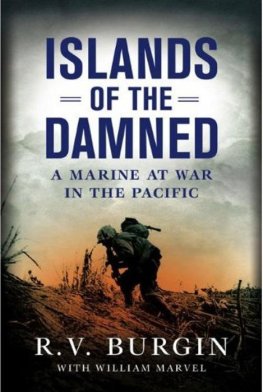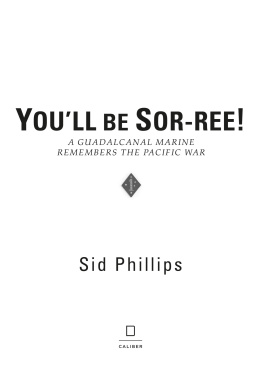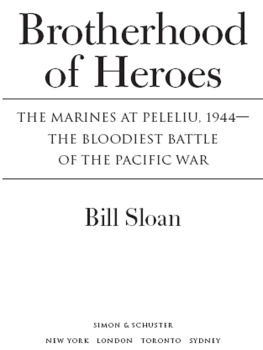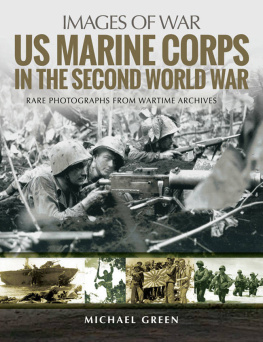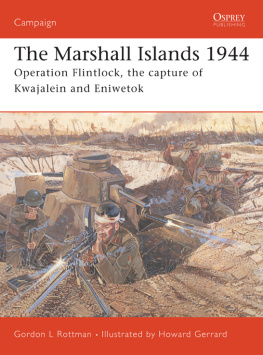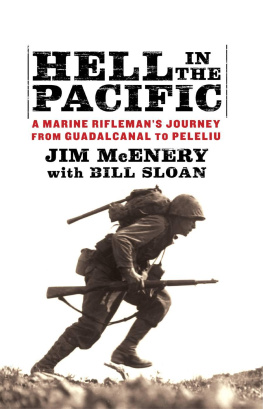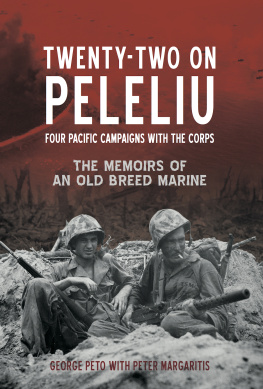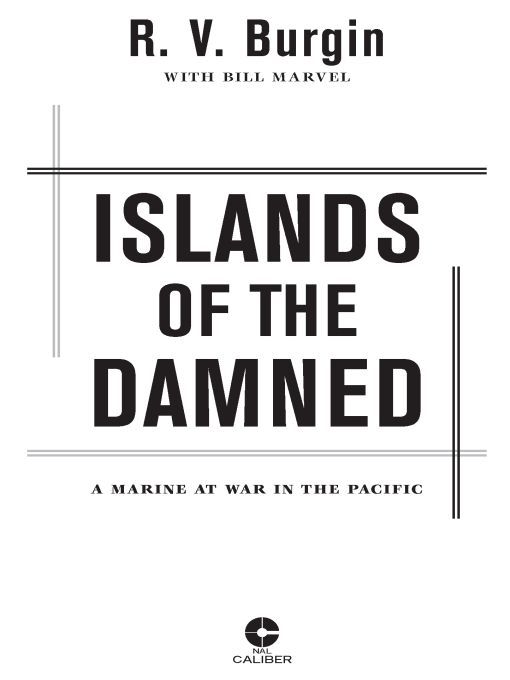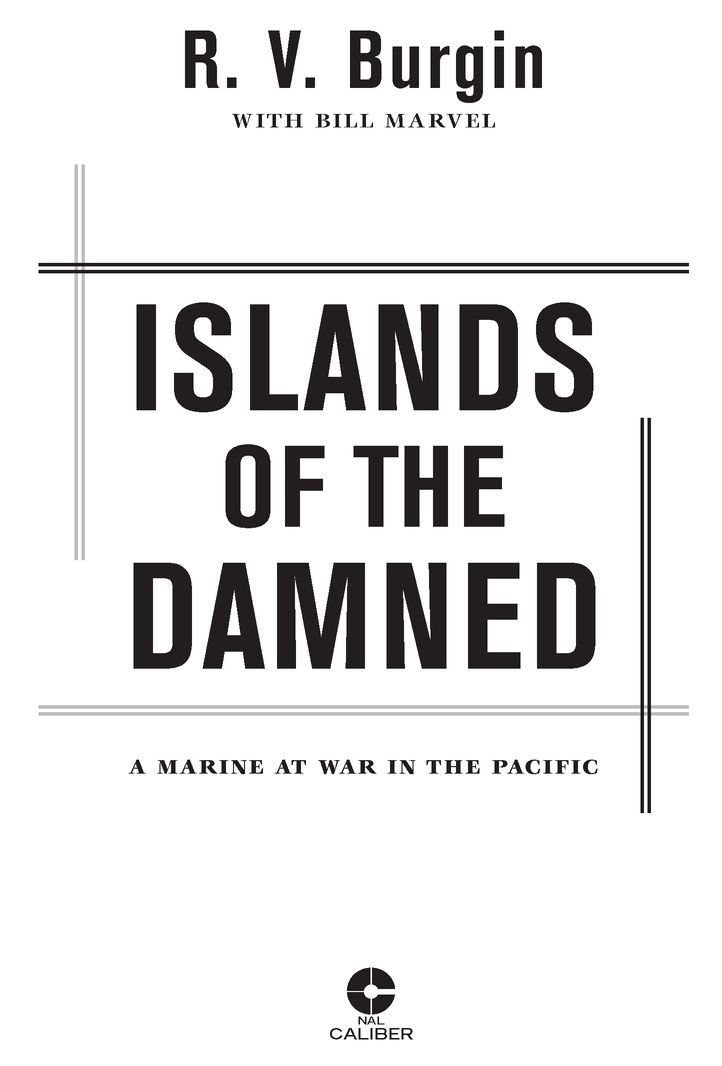Table of Contents
Dedicated to the men in K Company, Third Battalion, Fifth Marine
Regiment, First Marine Divisionin K/3/5who fought so
valiantly in World War II.
PROLOGUE
Luck
I was born on the thirteenth of August, 1922.
My dad was born May 13, 1890.
His brothers, my twin uncles Romus and Remus, were born November 13, 1894. I was named after Romus.
I joined the U.S. Marines on the thirteenth day of November, 1942.
And a big 13 was painted on the side of the amtrac we were about to climb aboard that September morning in 1944, somewhere in the southwest Pacific. It was one of seventeen amtracs tucked into the bay of LST 661, anchored off the coast of a place none of us had ever heard of beforePeleliu.
Motors were gunning, pumping out stinking clouds of blue smoke when we climbed down the ladder into the cramped hold. After a morning up top washed by a steady sea breeze, our eyes burned. Below, it was close and hot as hell. We were burdened with combat packs, carbines, sidearms, first aid kits, KA-BAR knives, two canteens each, struggling to keep a foothold on the pitching deck. NCOs were barking orders into the racket:
First platoon, load!
Second platoon, load!
Third platoon, load!
Mortar section, load!
That was us: First Marine Division, Fifth Regiment, Third Battalion, K Company mortarsK/3/5 for short. Two mortars, six men each, two squad leaders, a sergeant and a lieutenant. I was a corporal in charge of one of our 60mm mortars.
Someone spotted the number on the side of the amtrac.
Jesus! Thirteen. Now were in the shit.
Dont worry, boys, I said. Thirteens my lucky number.
I believed I was going to come back in one piece. There were guys I knew, Marines I fought alongside, who got a feeling their time was up. Once they got it you couldnt talk them out of it. When we had been fighting to hang on to Walts Ridge on New Britain, Lonnie Howard said, Burgin, if anything happens to me, I want you to take my watch.
Youre crazy, I told him. Youll be okay. Nothings going to happen to you.
That night one of our artillery shells hit nearby. The shrapnel killed Howard and another Marine, Robert McCarthy.
Me, I was anxious and wary that morning off Peleliu. But I never thought for a minute I wouldnt make it.
Number 13 was one of the older amtracs, the ones without a drop-down back end. When we rolled up on the beach wed have to scramble over the sides. Thats when the Japs would have a clear shot at us. That didnt seem so lucky.
There were about twenty of us, plus the driver, probably a Navy man, all jammed together like toes in a shoe. While we waited, sailors topside looked us over, giving us the thumbs-up and shouting encouragement that we couldnt hear over the noise. Finally the big clamshell doors of that LSTLanding Ship, Tankcranked open. Number 13 shuddered, and we followed the other amtracs down the ramp, nosed into the water, and floated out into the bright morning sun.
It was a little past eight oclock.
An amtrac at sea wallows like a buffalo. The flat-bottomed Higgins boats could do twelve knots. We barely managed four and a half, which is about as fast as a man can walk. Think of us walking to shore under fire. We circled for half an hour until the beach master dropped his red flag, the signal to form up and head for shore. Our battleships and cruisers had been working over the island since dawn, guns cracking like thunder. They paused long enough for the Dauntless dive-bombers and TBMs to sweep in and dump their bombs. Then they started up again. After our wave got under way, a couple LSTs that were parked out on our flanks sent swarms of rockets screeching over our heads. Id never heard a sound like that before. Something like cloth ripping. A curtain of black smoke hung over the whole beach. It looked like the island was on fire.
Somewhere along our way in Jap artillery found the range and started working us over. The last thousand yards we were under fire the whole way. Over the general racket I couldnt hear bullets dinging Number 13, but we kept our heads down anyway. Shells were smacking the water all around us, raising big spikes of foam. Here and there other LSTs and Higgins boats would disappear in a roar of flame. The first bodies floated by. Wed see many more.
About seven hundred yards out, Number 13 lurched and halted, pitching us into one another. Treads flailed and something went grinding and scraping beneath our hull. Wed struck a reef. Now the Jap shells were landing closerleft, right and behind us. We sat there churning the water, and minutes seemed to drag by, though Im sure only seconds were passing.
Our sergeant, Johnny Marmet, leaned forward and stuck his .45 in the drivers face.
If you dont get this son of a bitch moving, Im going to by God shoot you in the head! he shouted. Were sitting ducks out here!
The driver was pushing and pulling controls like a madman, trying to rock a car out of the mud. Treads were spinning, kicking up spray. Then something gently lifted us and we were moving again.
The instant we broke free, an explosion ripped the water right in front of us, dousing us with spray.
I made a quick mental calculation. All that time wed been moving toward the shore, some Jap gunner was watching us, leading his target. When he figured the trajectory of his shell would intersect our path, he fired. The seconds wed hung up on that reef were just long enough. If wed been plowing forward wed have ended up just where he calculated. That shell would have landed in our laps.
None of us talked about it afterward. We were busy with other things. But I honestly believed it then, and I believe it today. That was a God thing that hung us up on that reef.
Wed been lucky back on Cape Gloucester, too. The Japs expected us, but not where we landed, and we went ashore almost unnoticed and unopposed.
At Peleliu they were waiting for us and they hit us with everything they had. After we stalled on the reef they never gave us a moments rest. We never felt safe and we never let down our guard, not even for a minute, until the day we left the island.
Number 13 rolled up onto the beach and we bailed over the sides, dropped to the sand and took off running. Thats Marine doctrine: Get off the beach. Youre a target. Youre cluttering things up. Move out!
Beyond the beach lay a strip of dense scrub and, two hundred yards beyond, the enemy airfield that was our first days objective. A wall of steep hills covered with dense scrub arose behind the airfield. Navy guns were pouring shells into the far edge of the airfield and the high ground beyond, laying in white phosphorous smoke to screen our landing. There was no breeze, and it hung in the air, drifting back over the beach and mingling with black smudge from amtracs and DUKWs burning in the surf.
Coming in, wed seen our own men floating in the water. Now we came upon the bodies of the Japs who had been caught in the bombardment before we landed. And the body parts. We also saw shell casings, Marine helmets, combat packs, weapons lost or discarded. All battlegrounds eventually look like trash dumps. As the temperature climbed past a hundred, we started dumping things ourselves. The gas masks were the first to go. Then our canvas leggings. They were a nuisance, hot and chafing. Most of us hated them. Later in the day I came upon a bazooka on the ground and I knew exactly who had left it. A bazooka weighed about twenty-four pounds, and he didnt want to carry it. I caught up with him a little farther along and handed it to him. I said, Dont you ever lay that thing down again and walk off and leave it.



